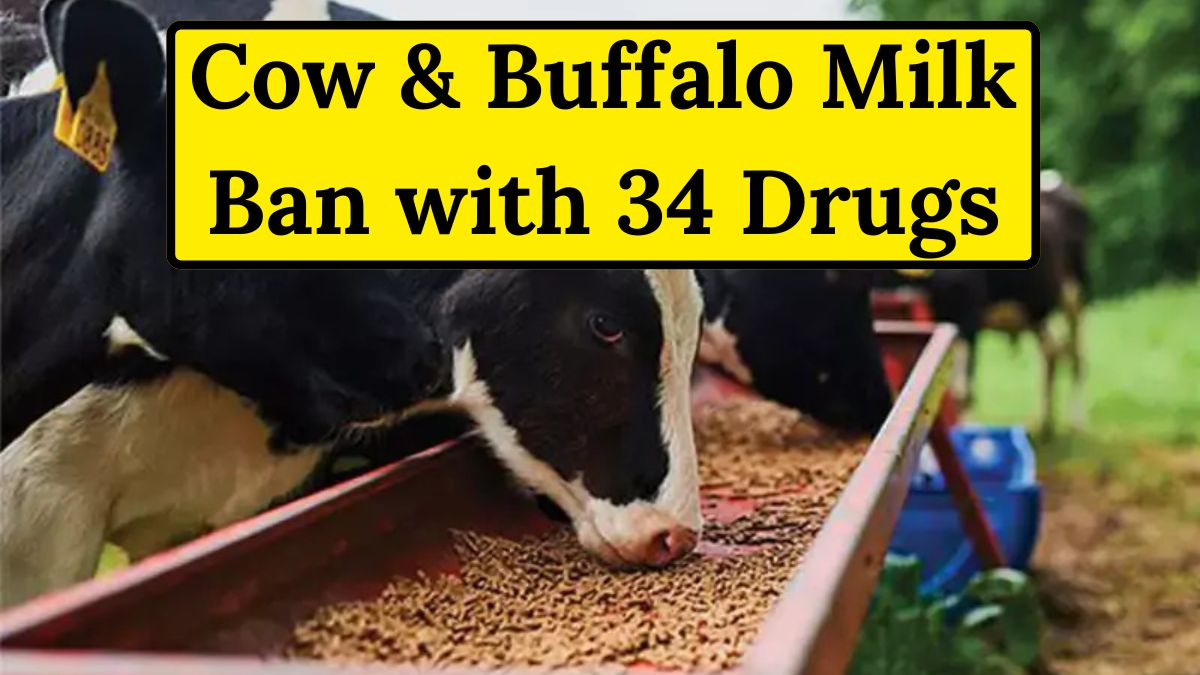Cow and Buffalo Milk Ban with 34 Drugs: What It Means for Farmers and Consumers: Have you ever thought the glass of milk on your table could carry hidden risks? Shocking, right? The central government has just announced a big move a complete ban on cow and buffalo milk linked with 34 appetite-enhancing and infection-preventing drugs. Violating this ban can now land offenders in jail for three years, along with a heavy fine.
This isn’t just another policy update. It’s a decision that directly impacts farmers, dairy businesses, and every Indian household that depends on milk daily. So, what’s really going on here? Let’s break it down.
Why Did the Government Ban These Drugs?
Here’s the thing for years, certain medicines were being misused in the livestock industry. These drugs, which include antibiotics, antivirals, and antiprotozoals, were given to animals not just to treat infections but to:
- Boost appetite.
- Increase milk production.
- Prevent diseases unnaturally.
On the surface, that might sound beneficial. But the real problem is that traces of these drugs often remain in meat, milk, and other dairy products. When humans consume them, it leads to something dangerous drug resistance.
Think about it this way: If you drink milk carrying antibiotic residues, your body slowly becomes resistant to actual medicines. When you really need antibiotics in the future, they may not work effectively. That’s a scary thought.
Which Drugs Have Been Banned?
The Union Health Department’s notification includes a total of 34 drugs that are no longer allowed in livestock farming:
Antibiotics (15)
Examples include:
- Ureidopenicillins
- Ceftobiprole
- Ceftaroline
- Carbapenems
- Glycopeptides
- Lipopeptides
- Oxazolidinones
- Fidaxomicin
- Plazomicin
- Eravacycline
- Omadacycline
Antivirals (18)
Examples include:
- Amantadine
- Baloxavir Marboxil
- Favipiravir
- Molnupiravir
- Oseltamivir
- Ribavirin
- Laninamivir
Antiprotozoal (1)
- Nitazoxanide
These medicines were earlier being used in dairy animals, poultry, sheep, goats, pigs, and even bees.
Haryana Government Steps In
Soon after the Centre’s decision, the Haryana Drug Controller, Lalit Goyal, issued strict guidelines. Chemist shops and drug inspectors have been instructed not to sell these medicines for animal use.
And here’s the warning: any violation will attract up to three years in prison plus a fine.
The good news? Safer alternative medicines for livestock are available, so farmers don’t have to worry about losing treatment options for their animals.
What Does This Mean for You and Me?
Let’s be honest most of us drink milk every single day. For children, milk is often considered a complete meal. This ban is not just about protecting animals, it’s about protecting human health too.
Here’s why it matters:
- Safer Food on Your Plate: With banned drugs out of the system, milk and meat will be cleaner and safer.
- Lower Risk of Drug Resistance: Medicines will remain effective for humans when we really need them.
- Better Animal Health Practices: Farmers will move towards safer and more sustainable methods.
In short, this is a step toward healthier families and a stronger future.
Frequently Asked Questions
Q1. Why did the government ban cow and buffalo milk linked to these drugs?
Because these drugs were being misused to boost milk production and prevent infections in animals, leaving harmful residues in dairy products that can affect human health.
Q2. What is the penalty for violating the ban?
Anyone caught manufacturing, importing, or selling these banned drugs for livestock could face up to three years in prison plus a fine.
Q3. Are there safer alternatives for farmers?
Yes. The government has clarified that safe veterinary medicines are available in the market, ensuring animals can still be treated without risking public health.

